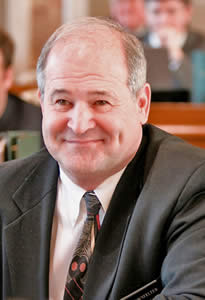
Veto session
Revenue numbers
Budget
KanCare
Schools respond to block grants
Budget reductions for KDOT
Veto session
The legislature is back from a three week break and still has plenty to accomplish before the 90-day session adjourns in mid-May.
Moving forward the House and Senate will have to find solutions to the state’s revenue shortfall and agree to a budget for the 2016 and 2017 fiscal years. Your input is invaluable to me during this process so please do not hesitate to contact me by calling my office at 785-296-7691 or emailing me at stan.frownfelter@house.ks.gov.
Revenue numbers
The Consensus Revenue Estimating Group announced last week the state revenue will be lower than originally thought.
The estimating group includes the Legislative Research Department, Division of the Budget, Department of Revenue, and three consulting economists from state universities. Based on the steady decline of revenue reported by the state, the group lowered its estimates. They now predict the state will only collect $5.7 billion in revenue.
The state cannot spend more than it takes in, so the budget must be balanced before the end of the fiscal year. As of now, the governor has yet to offer a sustainable solution to address the shortfall. Kansas cannot afford to continue on this path.
Budget
The legislative session is nearly over, and there has still yet to be any meaningful action on the state 2016 and 2017 budget. As it stands now the proposed budget is structurally imbalanced and will require more than $220 million in budget cuts or new taxes for 2016 and 2017 fiscal years.
The governor suggests funding the budget by:
• Raising taxes on alcohol by 4 percent.
• Raising taxes on cigarettes by more than $1.50 per pack.
• Reducing the state’s investment into public employee’s pensions.
None of the governor’s revenue proposals offer stable long-term solutions for the Kansas budget. I will oppose any proposal that places the tax burden unfairly on the back of middle class and working Kansans.
KanCare
Two years ago the state privatized the administration of Medicaid through a program called KanCare, and the privatization has proven to be ineffective and costly. This week the KanCare Oversight Committee met to receive an update on the program. The committee was informed of two concerns:
• Over the past two years the three KanCare companies have collectively lost more than $170 million. As for profit companies, they are in business to make money, so it is likely that disrupting changes will be made in the future at the expense of Kansans’ health.
• The position of inspector general has been vacant for almost a year. The governor is responsible for appointing a qualified individual to independently manage and oversee that each company is complying with the necessary rules and regulations.
Services for those Kansans most in need are not being provided and coverage is being denied because as a private business, these companies are dedicated to making a profit at the expense of those who use their services.
Schools respond to block grants
Kansas schools are being forced to make difficult budgetary decisions as a result of the governor’s block grant program which cut more than $51 million from K-12 education.
Some districts are exploring alternative funding by raising local property taxes while others are trying to make ends meet by cutting schools days short, ending the year early, limiting classroom resources, and reducing staff size. I voted no to implementing a block grant policy because the future of our state cannot be sustained if our children’s education is not protected.
Budget reductions for KDOT
The governor’s proposed transfers from the Kansas Department of Transportation’s Highway Fund will reduce the fund by more than $1 million a day. A recent report released by the Kansas Department of Transportation indicates that the transfers will bankrupt the fund.
Taking money from the fund, a proven job creator will delay necessary projects for local communities across the state and will contribute to the continued disintegration of our roads, threating the safety of Kansas drivers.
